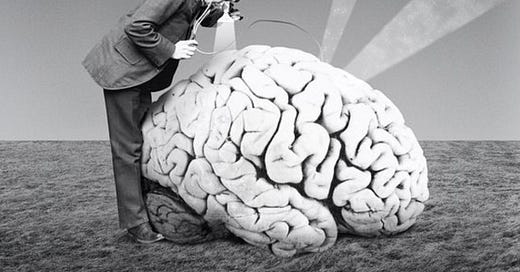What if we stopped the word-salading and intellectual d*ck-swinging?
And returned to wisdom?
This is Chapter 19 in the Book Serialisation and it fleshes out another fundamental aptitude for creating “Islands of Sanity”: Wisdom.
You’re new here? You can start at the beginning and navigate around using this Table of Contents if you like. The audio version is at the bottom, available only to subscribers. Ditto the conversation in the comments section where we workshop things together.
<Previous Chapter | Table of Contents | Next Chapter>
WISDOM
“To learn which questions are unanswerable, and not to answer them: this skill is most needful in times of stress and darkness.”
- Ursula K. le Guin
*
“You saw the whole of the moon.”
- The Waterboys
*
We have lost wisdom and we need it more than ever.
*
Humans ache forward. We have an innate desire to be more, know more, reach more, reproduce more. We yearn to connect with the magnanimous nature of the universe, to be part of the love that connects the atoms, and to express it all generously.
The Greeks called this “spiritedness” thumos. Thumos turned up in all the myths. It was what drove mortals to sacrifice and confront death and it was accompanied by a need to be recognised in one’s said spiritedness. Plato cited examples of thumos - the hero’s love of glory, the sage’s search for deeper insights (and desire to record it for others). He also emphasised the need for thumos to be kept in check (which is where the Gods stepped in) lest such spiritedness spun out of control and present as megalomania and fascism, and as one man’s insistence on flying too close to the sun, another man’s belief that he can just go destroy Earth to colonise Mars.
Many centuries later, writing in The End of History and the Last Man, Francis Fukuyama warned that the vacuum of meaning and the absence of moral guard-railing in our civilisation’s consumptive culture would invariably see thumos run amok, manifesting in violent and perverse ways. Without the right kind of wisdom in a society, thumos can turn into explosive destruction in the snort of a line of coke.
*
Over the course of this journey, it’s become increasingly obvious that the corrective to so much of what we are in is the restoration and cultivation of wisdom. The data sets, clever modelling, word salads, knowledge peacocking - it doesn’t cut it now. We need the morality-based, spiritually-grounded, systems-informed, restraint-ready, entangled, courageous truths of the ages if we are to manage collapse to the most humane outcome possible - if we are to “hospice modernity” as Vanessa Andreotti frames it.
We need wisdom to tame the too-spirited chaos-stokers and to dodge the moloch-making. We need wisdom to guide us into the entanglement so that we can emerge into what I continue to believe will be a better, braver new world. We need it to navigate the externalities and complexities as we continue to work on the ideas that we want “lying around” as we go about emerging into this next world.
And for all of us here, signed up to being of radical service in whatever way we can, we also need wisdom to reassure us we’re ok. We need sound, entirely congruent guidance that tells us we’re on the right track and that, yes, we must keep moving through the pain, the doubt, the uncertainty. Because this is what is right and good now.
*
I’m now going to draw heavily on the work of psychiatrist Dr Iain McGilchrist; a lot of people in this space eventually do. McGilchrist has spent 15 years developing a theory that shows how and why we’ve lost wisdom. His work, spread across two books - The Master and His Emissary and The Matter with Things, Our Brains, Our delusions and The Unmaking of the World1 - assembles the scientific evidence for how the left and right hemispheres of the brain affect the way we interact with and create the world.
The short version: The left hemisphere is a narrow, extractive, problem-solving “machine” that divides and conquers things. It's responsible for linear thinking, the nuts and bolts of language, and it works to a materialist understanding of things.




